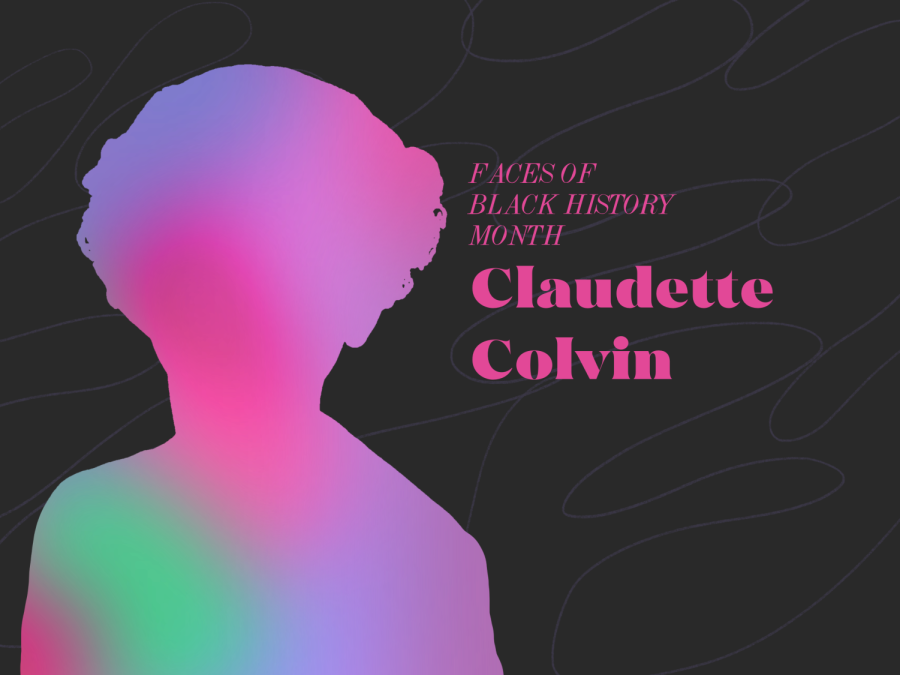Featuring the voices of change
Claudette Colvin, the pioneer who sparked the civil rights movement
A graphic created by graphic design artist Riley Gillum features Montgomery Bus Boycott pioneer Claudette Colvin.“It’s critical to have Black leaders not only for representation but also for guidance,” junior Ife Okororie said. “Through their experiences, Black leaders can effectively mentor and train more leaders to achieve the representation needed in the Black community.” Colvin is a unpopular initiator whose actions allowed her to become a staple within the Civil Right Movement.
Most people know about Rosa Parks and the Montgomery bus boycott in 1955, but very few are aware of the other women who refused to give up their seats. Nine months before Parks’ boycott, 15-year-old Claudette Colvin refused to involuntarily surrender her seat on a segregated bus to a person of white color. Colvin was the first to challenge the law at a young age and sparked an era of revolution.
When ordered by the bus driver to give up her seat to a white woman, she refused by saying she paid for her ticket and that it was her constitutional right.
Her education at her segregated school influenced Colvin. Before Colvin’s boycott, she learned about African American leaders and the U.S. Constitution. They discussed the unjust treatment African Americans faced daily under segregation laws in class. Being aware of her constitutional rights allowed her to find the confidence to protest against the racism she encountered.
“It’s important for people to be knowledgeable of their rights so they can point out injustice when they see it,” junior Ife Okororie said. “Rights like the freedom to protest and the freedom to vote have to be internalized [so] when people try to take that away, you can fight back with confidence.”
When protesting, Colvin felt comforted by the idea that leaders such as Harriet Tubman and Sojourner Truth had risen against injustice. These leaders motivated her to persist and remain seated.
“It’s critical to have Black leaders not only for representation but also for guidance,” Okororie said. “Through their experiences, Black leaders can effectively mentor and train more leaders to achieve the representation needed in the Black community.”
Colvin’s civil rights were violated when two police officers arrested her for refusing to move seats despite her advocation. Her case went to trial later that year, and she was charged with three different crimes, though two of her charges were later dropped for breaking segregation laws. Colvin was found guilty of assaulting the police officer who had arrested her.
Following Colvin’s verdict, various Civil Rights leaders in Montgomery became outraged. Rosa Parks, for example, began raising funds for Colvin’s case. Park’s believed that Colvin’s arrest would empower other young people to take action.
Although leaders considered using Colvin as an example of empowerment, many believed she was simply a young girl who was too impulsive and ruled with her emotions to effectively represent the Civil Rights movement. Therefore, when Rosa Parks made headlines for her bus boycott, Colvin was overlooked as Parks was considered a perfect fit for the role.
“It is important to [highlight] Black leaders because of how hard they worked to be noticed,” junior Jackie Powell said. “It is important to show their [up bringing] because it shows how hard Black people worked to be seen as an authority figure.”
Despite community members perceiving her as a troublemaker, Colvin was named a plaintiff in Browder v. Gayle, a lawsuit that challenged the integrity of Montgomery’s segregation laws. Although not well known, this ruling allowed for the boycott to be named a success as it legally ended segregation on buses and ignited movements across the nation.
Claudette Colvin continues to fight for progress within the Black community. For 70 years now, she has challenged her arrest records to be expunged. She believed that fighting to have her name cleared would demonstrate how progress is achievable and inspire others to advocate for change.
At 82, Colvin’s records were expunged, and she is no longer considered a juvenile delinquent. Her protests have allowed for the same considerations to apply for other Civil Rights leaders such as Martin Luther King Jr. and Rosa Parks.
For years, Colvin’s story was untold, but she finally gained recognition for her pioneering actions and played an empirical role in the movement. Her spontaneous acts of defiance were the seed for challenges against transportation segregation laws and birthed an era of revolution.
Your donation will support the journalists of Hill Top Times and RH Media. Your contribution will help cover travel and registration costs needed for state and national conventions.

Ananya Nandyala is a senior at Rock Hill High School. This is her second year on staff, and she is one of the social media/marketing directors. In her...











